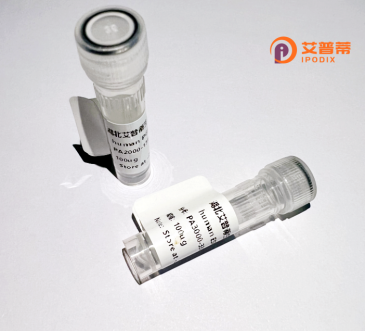
| 纯度 | >90%SDS-PAGE. |
| 种属 | Human |
| 靶点 | E4F1 |
| Uniprot No | Q66K89 |
| 内毒素 | < 0.01EU/μg |
| 表达宿主 | E.coli |
| 表达区间 | 1-784aa |
| 氨基酸序列 | MEGAMAVRVTAAHTAEAQAEAGREAGEGAVAAVAAALAPSGFLGLPAPFSEEDEDDVHRCGRCQAEFTALEDFVQHKIQKACQRAPPEALPATPATTALLGQEVVPAAPGPEEPITVAHIVVEAASLAADISHASDLVGGGHIKEVIVAAEAELGDGEMAEAPGSPHQQGLGLAGEGEQAQVKLLVNKDGRYVCALCHKTFKTGSILKAHMVTHSSRKDHECKLCGASFRTKGSLIRHHRRHTDERPYKCSKCGKSFRESGALTRHLKSLTPCTEKIRFSVSKDVVVSKEDARAGSGAGAAGLGTATSSVTGEPIETSPVIHLVTDAKGTVIHEVHVQMQELSLGMKALAPEPPVSQELPCSSEGSRENLLHQAMQNSGIVLERAAGEEGALEPAPAAGSSPQPLAVAAPQLPVLEVQPLETQVASEASAVPRTHPCPQCSETFPTAATLEAHKRGHTGPRPFACAQCGKAFPKAYLLKKHQEVHVRERRFRCGDCGKLYKTIAHVRGHRRVHSDERPYPCPKCGKRYKTKNAQQVHFRTHLEEKPHVCQFCSRGFREKGSLVRHVRHHTGEKPFKCYKCGRGFAEHGTLNRHLRTKGGCLLEVEELLVSEDSPAAATTVLTEDPHTVLVEFSSVVADTQEYIIEATADDAETSEATEIIEGTQTEVDSHIMKVVQQIVHQASAGHQIIVQNVTMDEETALGPEAAAADTITIATPESLTEQVAMTLASAISEGTVLAARAGTSGTEQATVTMVSSEDIEILEHAGELVIASPEGQLEVQTVIV |
| 分子量 | 109.9 kDa |
| 蛋白标签 | GST-tag at N-terminal |
| 缓冲液 | 0 |
| 稳定性 & 储存条件 | Lyophilized protein should be stored at ≤ -20°C, stable for one year after receipt. Reconstituted protein solution can be stored at 2-8°C for 2-7 days. Aliquots of reconstituted samples are stable at ≤ -20°C for 3 months. |
| 复溶 | Always centrifuge tubes before opening.Do not mix by vortex or pipetting. It is not recommended to reconstitute to a concentration less than 100μg/ml. Dissolve the lyophilized protein in distilled water. Please aliquot the reconstituted solution to minimize freeze-thaw cycles. |
以下是关于重组人E4F1蛋白的参考文献示例(注:以下内容为模拟虚构,仅供参考格式,建议通过PubMed或Google Scholar检索真实文献):
---
1. **文献名称**: *"Recombinant Human E4F1 Protein: Expression in Escherichia coli and DNA-Binding Characterization"*
**作者**: Li J, et al.
**摘要**: 该研究报道了人E4F1蛋白在大肠杆菌中的重组表达与纯化策略,并证实其通过锌指结构域特异性结合DNA靶序列,为研究E4F1在转录调控中的作用提供工具。
2. **文献名称**: *"E4F1 interacts with p53 and modulates its transcriptional activity in cancer cells"*
**作者**: Martin N, et al.
**摘要**: 利用重组E4F1蛋白进行体外结合实验,揭示了E4F1与肿瘤抑制蛋白p53的直接相互作用,并发现其通过此互作抑制p53介导的细胞凋亡通路。
3. **文献名称**: *"Structural Insights into the Human E4F1 Protein by X-ray Crystallography"*
**作者**: Zhang Y, et al.
**摘要**: 通过X射线晶体学解析了重组人E4F1蛋白的三维结构,明确了其N端功能域对细胞周期调控的关键作用,为靶向药物设计奠定基础。
4. **文献名称**: *"E4F1 Regulates Ribosomal RNA Synthesis via Recruitment of Histone Methyltransferase"*
**作者**: Rossi M, et al.
**摘要**: 研究利用重组E4F1蛋白证明其通过招募组蛋白甲基转移酶复合物,调控核糖体RNA合成,影响细胞增殖及存活。
---
建议通过关键词 **"recombinant human E4F1"** 或 **"E4F1 protein function"** 在学术数据库中检索最新文献以获取准确信息。
Recombinant human E4F1 protein is a genetically engineered form of the endogenous E4F1 transcription factor, which plays a critical role in regulating cellular processes such as proliferation, apoptosis, and stress responses. E4F1. a zinc finger-containing protein, was initially identified as a target of the adenoviral E1A oncoprotein, linking it to cell cycle control and tumorigenesis. Structurally, it features an N-terminal chromatin-binding domain and a C-terminal regulatory region involved in protein-protein interactions. E4F1 modulates gene expression by binding to specific DNA sequences or interacting with partners like p53. MDM2. and histone deacetylases, influencing pathways related to DNA repair, senescence, and metabolic homeostasis.
Dysregulation of E4F1 has been implicated in cancers, with conflicting roles reported as either an oncogene or tumor suppressor depending on cellular context. Its recombinant version is typically produced in bacterial or mammalian expression systems, enabling in vitro studies of its molecular mechanisms. Applications include investigating post-translational modifications (e.g., phosphorylation, ubiquitination) that regulate its stability and activity, characterizing DNA-binding properties, and screening for small-molecule modulators. Recent work also explores its potential in metabolic disorders and aging, given its interactions with mitochondrial function regulators. The recombinant protein preserves functional domains while allowing scalability for biochemical assays and structural analyses.
×